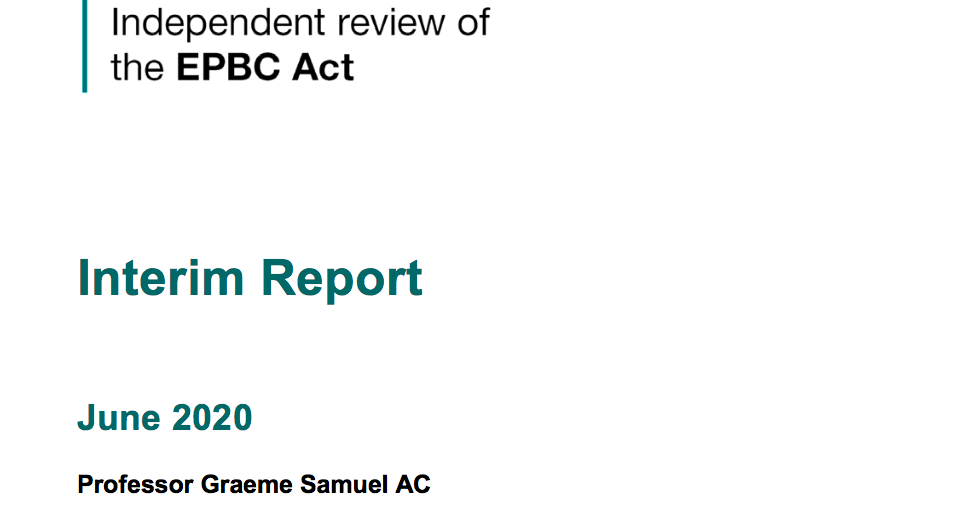Well that comes as no surprise under successive right wing governments…
The operation of the Environmental Protection and Biodiversity Conservation1999 Act (EPBC) is ineffective and does not enable the Commonwealth to protect and conserve environmental matters that are important to the nation, an interim report has found.
The landmark report, written by independent author Graeme Samuel, said the act was not fit to address current or future environmental challenges and is in need of new and legally enforced National Environmental Standards (NES) as a centrepiece for reform.
“The operation of the [act] is dated and inefficient, and it is not fit to manage the current or future environmental challenges,” Professor Samuels wrote in the foreword, adding that the NES should be a priority reform measure with immediate interim standards.
Media statement: Professor Graeme Samuel AC releases Interim Report

Media statement from Professor Graeme Samuel AC: Release of Interim Report for the Independent Review of the Environment Protection and Biodiversity Conservation Act 1999
Today the Interim Report of the Independent Review of the Environment Protection and Biodiversity Conservation Act 1999 (EPBC Act) has been released.
The Interim Report sets out preliminary views on the EPBC Act and how it operates. It focuses on the fundamental problems of the legislation and proposes reform directions that are needed to address these.
The Independent Reviewer, Professor Graeme Samuel AC, said “the Interim Report has been released part way through the Review as an opportunity to share and test thinking.
“The EPBC Act is ineffective. It does not enable the Commonwealth to protect and conserve environmental matters that are important for the nation. It is not fit to address current or future environmental challenges.
“The EPBC Act results in duplication with state and territory environment laws. The Commonwealth process for assessing and approving developments is slow, complex to navigate and costly for business. Slow and cumbersome regulation results in significant additional costs for business, with little appreciable benefit for the environment.”
Professor Samuel said “New, legally enforceable National Environmental Standards should be the centrepiece of reform—setting clear and concise rules that deliver outcomes for the environment and enable development to continue in a sustainable way.
“The development of National Environment Standards should be a priority reform measure. Interim Standards could be developed immediately, followed by an iterative development process as more sophisticated data becomes accessible. Standards should focus on detailed prescription of outcomes, not process.”
“National Environmental Standards will mean that the community and business can know what to expect. Standards support clear and consistent decisions, regardless of who makes them. Where states and territories can demonstrate their systems can deliver environmental outcomes consistent with the Standards, responsibilities should be devolved, providing faster and lower cost development assessments and approvals.”
“Community trust in the EPBC Act and its administration is low. To build confidence, the Interim Report proposes that an independent cop on the beat is required to deliver rigorous, transparent compliance and enforcement.”
Professor Samuel emphasised that “the EPBC Act had failed to fulfil its objectives as they relate to Indigenous Australians.
“Sustained engagement with Indigenous Australians is needed to properly co-design reforms that are important to them.
“Much more needs to be done to respectfully incorporate valuable Traditional Knowledge of Country in how the environment is managed.
“Indigenous Australians seek, and are entitled to expect, greater protection of their heritage,” Professor Samuel said.
“Extra effort is needed to invest in improving the condition of the environment. This means the EPBC Act needs a firmer focus on avoiding impacts where possible and increasing the area of nationally important habitats. This will allow future development to be sustainable.
Given contested views of how Australia can best achieve ecologically sustainable development, Professor Samuel said it is “unlikely that everyone will agree on all the issues identified in the Interim Report or support all the proposed reform directions.
“The Review encourages consideration of the overall reform direction proposed, rather than its component parts,” Professor Samuel said.
“The proposed reforms seek to build community trust that Australia’s national environmental laws are delivering effective environment and heritage protection, while regulating businesses efficiently.
“The proposed reforms enable the Commonwealth to show national leadership, while working more closely with the states and territories to deliver a joined-up approach to environmental management.
“Reform of the EPBC Act is well overdue and necessary to ensure current and future generations can enjoy Australia’s unique environment and iconic places.” Professor Samuel said.
Next steps in the Review
All Australians are invited to have a say about the reform directions in the Interim Report. To read the Interim Report and have your say visit the website https://epbcactreview.environment.gov.au/.
Professor Samuel now intends to engage in targeted consultations with stakeholders. throughout July, August and September. These consultations will focus on progressing the key reform directions proposed in the Interim Report, including refining the National Environmental Standards.
Professor Samuel intends to convene collaborative discussions with environment, indigenous, agriculture and business groups, and leading academics. These discussions will involve stakeholders who had provided substantive contributions to the Review and have indicated a willingness to collaborate to shape a reform pathway. Consultation with state and territory governments will also be undertaken.
Professor Samuel’s Final Report, including recommendations to government, is due to be delivered to the Minister for the Environment by 31 October 2020.
Proposed key reform directions
- The Commonwealth should continue to focus on existing areas of responsibility with no expansion to regulate new environmental matters.
- New, legally enforceable National Environmental Standards should be established to deliver ecologically sustainable development. Focused on outcomes rather than process.
- Streamlining and greater efficiency through devolution in a way that provides community confidence, with National Environmental Standards as the foundation to set the outcomes needed regardless of who the decision maker is.
- Strong and transparent assurance to ensure devolved decisions deliver the intended outcomes.
- Australia’s Indigenous cultural heritage laws need to be reviewed and more work is needed to support better engagement with Indigenous Australians and to respectfully incorporate Traditional Knowledge of Country in how the environment is managed.
- Build trust in the system through increased transparency of information and decision-making to reduce the need to resort to court processes to discover information. Legal challenges should be limited to matters of outcome, not process.
- A quantum shift in the quality of information is needed, so that the right information is available at the right time for the community, proponents and decision-makers. This will deliver better decisions, and faster and lower cost assessments and approvals.
- A coherent framework to monitor and evaluate the effectiveness of the EPBC Act is needed, including revamped State of the Environment reporting.
- Restoration of the environment must be a focus. Available habitat needs to grow to be able to support both development and a healthy environment. Explore ways to accelerate environmental restoration such as markets and co-investing with the philanthropic and private sectors.
- An independent compliance and enforcement regulator that is not subject to actual or implied political direction. It should be properly resourced and have a full toolkit of powers.





